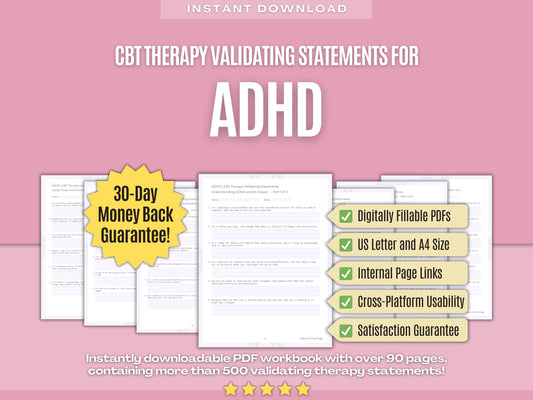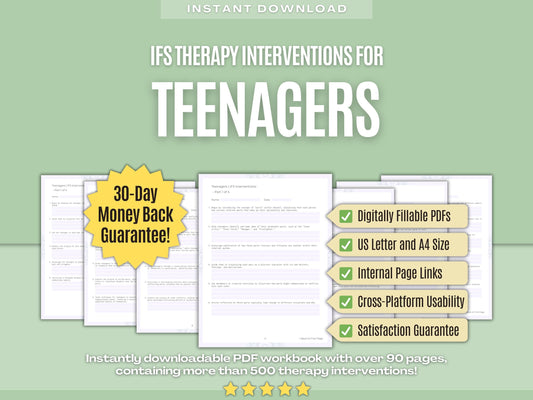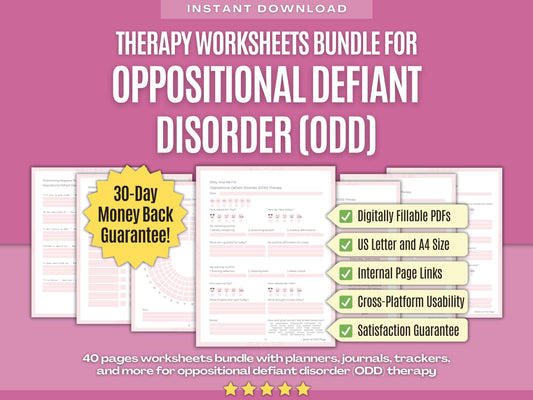Elevate Your Therapy and Guide Your Clients to Inner Healing with Our Women Coping Skills! ✨
1. Cultivating Self-Compassion
- Practice daily affirmations to reinforce self-worth and acceptance.
- Write in a journal to express and process your thoughts and feelings in a safe space.
- Prioritize self-care activities that nourish your mind, body, and spirit.
- Seek support from trusted friends, family members, or support groups during difficult times.
- Engage in acts of self-compassion, such as treating yourself with kindness and understanding.
- Engage in hobbies or activities that bring you joy and fulfillment.
- Practice gratitude by focusing on the positive aspects of your life and yourself.
- Engage in physical activity to boost mood and reduce stress.
- Practice self-compassion meditation to cultivate feelings of warmth and kindness toward yourself.
- Set realistic goals and celebrate small victories along the way.
- Challenge unrealistic expectations by acknowledging your humanity and limitations.
Need more? Find all 500+ Coping Skills for Women Therapy in our Digital Workbook!
2. Building Confidence and Self-Esteem
- Identify and challenge negative self-beliefs by examining evidence that contradicts them.
- Practice self-compassion by treating yourself with kindness and understanding, especially during setbacks.
- Engage in activities that showcase your strengths and talents, boosting feelings of self-efficacy.
- Take care of your physical health through regular exercise, nutritious eating, and adequate rest.
- Celebrate your accomplishments, no matter how small, to reinforce feelings of success and capability.
- Engage in activities that promote relaxation and stress reduction, such as meditation or deep breathing exercises.
- Identify and challenge comparison traps by focusing on your unique journey and progress.
- Engage in activities that challenge and expand your comfort zone, fostering personal growth and resilience.
- Seek out opportunities for learning and skill development to enhance feelings of competence and mastery.
- Create a supportive environment by surrounding yourself with affirmations, inspirational quotes, or vision boards.
- Reflect on past challenges you have overcome, recognizing your resilience and inner strength.
Need more? Find all 500+ Coping Skills for Women Therapy in our Digital Workbook!
3. Managing Work-Life Balance
- Prioritize tasks based on importance and urgency to manage time effectively.
- Practice effective communication with employers, colleagues, and family members about your needs and limitations.
- Schedule regular breaks throughout the day to recharge and prevent fatigue.
- Utilize technology tools, such as calendar apps or task management software, to organize and streamline responsibilities.
- Create a supportive network of friends, family, or colleagues who understand and respect your need for balance.
- Set realistic expectations for yourself and others, recognizing that perfection is not attainable.
- Plan and prioritize leisure activities that bring joy and relaxation into your life.
- Seek flexibility in your work schedule, if possible, to accommodate personal obligations and interests.
- Practice gratitude for the opportunities and experiences afforded by both work and personal life.
- Practice boundary-setting techniques, such as assertive communication and negotiation, to protect your time and energy.
- Seek support from a therapist or counselor to explore underlying stressors and develop coping strategies.
Need more? Find all 500+ Coping Skills for Women Therapy in our Digital Workbook!
4. Addressing Body Image Issues
- Practice self-compassion by treating yourself with kindness and understanding, especially when facing negative thoughts or feelings about your body.
- Engage in activities that promote body positivity and self-acceptance, such as participating in body-positive communities or following body-positive influencers.
- Limit exposure to media and social media that perpetuate unrealistic or harmful beauty ideals, and curate your online spaces to include positive and empowering content.
- Engage in activities that promote holistic well-being, such as regular exercise, nutritious eating, and adequate rest, with a focus on health rather than appearance.
- Practice mindfulness techniques to stay present and grounded in your body, reducing anxiety about appearance-related concerns.
- Cultivate a positive self-image by focusing on your strengths, talents, and accomplishments beyond physical appearance.
- Practice self-care activities that nourish your mind, body, and spirit, such as meditation, relaxation exercises, or creative expression.
- Develop coping strategies for managing triggers or situations that exacerbate negative body image, such as avoiding certain environments or practicing relaxation techniques.
- Practice assertiveness skills to set boundaries and advocate for yourself in situations where you feel judged or scrutinized based on your appearance.
- Seek out support from friends, family, or support groups who understand and validate your experiences with body image issues.
- Engage in activities that promote self-expression and creativity, allowing you to express yourself beyond appearance.
Need more? Find all 500+ Coping Skills for Women Therapy in our Digital Workbook!
5. Developing Healthy Boundaries
- Clearly communicate your needs, desires, and limits to others in a direct and assertive manner.
- Practice self-awareness by identifying situations or interactions where your boundaries are being violated or compromised.
- Learn to say "no" confidently and without guilt when requests or demands infringe upon your boundaries or well-being.
- Take responsibility for enforcing your boundaries, recognizing that it is your responsibility to communicate and uphold them.
- Seek support from friends, family, or a therapist who can validate your boundaries and provide encouragement as you establish and maintain them.
- Set boundaries around your time and energy, prioritizing activities and relationships that align with your values and goals.
- Practice boundary-setting in all areas of your life, including work, relationships, and social interactions.
- Learn to trust your instincts and intuition when it comes to recognizing situations or individuals that may not respect your boundaries.
- Set consequences for boundary violations and follow through with them consistently to reinforce the importance of respecting your boundaries.
- Surround yourself with supportive individuals who respect and honor your boundaries, and distance yourself from those who consistently disregard them.
- Practice self-validation by affirming your right to set and enforce boundaries, regardless of others' reactions or opinions.
Need more? Find all 500+ Coping Skills for Women Therapy in our Digital Workbook!
6. Overcoming Imposter Syndrome
- Challenge negative self-talk and self-doubt by reframing unhelpful thoughts and replacing them with more positive and realistic affirmations.
- Practice self-compassion by treating yourself with kindness and understanding, especially during moments of self-doubt or insecurity.
- Keep a record of positive feedback, accolades, and achievements to remind yourself of your worth and capabilities during moments of doubt.
- Recognize that imposter syndrome is a common experience shared by many high-achieving individuals, and that you are not alone in feeling this way.
- Challenge the belief that you need to be perfect or know everything in order to succeed, recognizing that growth and learning are ongoing processes.
- Practice assertiveness skills to advocate for yourself and your accomplishments, rather than downplaying or dismissing them.
- Seek out opportunities for professional development and skill-building to enhance your confidence and competence in your field.
- Embrace the discomfort of stepping outside your comfort zone, recognizing that growth and progress often occur through challenges and setbacks.
- Practice gratitude for the opportunities and experiences that have contributed to your success, recognizing the support and resources that have been available to you.
- Practice self-validation by affirming your worth and accomplishments, even when others may not recognize or acknowledge them.
- Challenge the belief that failure is synonymous with inadequacy or incompetence, recognizing that setbacks are opportunities for growth and learning.
Need more? Find all 500+ Coping Skills for Women Therapy in our Digital Workbook!
7. Addressing Sexual Health and Wellness
- Educate yourself about sexual health and wellness, including anatomy, reproductive health, contraception, sexually transmitted infections (STIs), and healthy sexual practices.
- Practice safer sex by using condoms or other barrier methods to protect against STIs and unintended pregnancy, especially if you or your partner(s) have multiple partners or are not in a monogamous relationship.
- Explore your own body through self-exploration, masturbation, or self-touch, gaining awareness and understanding of your own sexual preferences, responses, and pleasure.
- Set boundaries around sexual activities and intimacy, advocating for your comfort, consent, and well-being in sexual encounters.
- Practice self-compassion and acceptance regarding your body, desires, and sexual experiences, recognizing that diversity and variation are normal and natural.
- Practice assertiveness skills to communicate your sexual needs and desires with confidence and clarity, without feeling ashamed or embarrassed.
- Engage in regular physical activity and exercise to promote overall health and well-being, which can also have positive effects on sexual function and satisfaction.
- Seek out information and support regarding sexual dysfunctions or concerns, such as erectile dysfunction, low libido, or pain during intercourse, from healthcare providers or specialists.
- Engage in open and ongoing communication with healthcare providers about your sexual health concerns, questions, and goals, seeking guidance and support as needed.
- Practice self-care and stress management techniques to promote overall well-being and reduce the impact of stress on sexual health and function.
- Address any relationship or interpersonal issues that may be impacting your sexual health and satisfaction, seeking support from couples therapy or relationship counseling if needed.
Need more? Find all 500+ Coping Skills for Women Therapy in our Digital Workbook!
8. Practicing Assertiveness
- Practice self-awareness by identifying your own needs, feelings, and boundaries before entering into assertive communication situations, ensuring that you are clear about what you want to express.
- Practice active listening skills by giving your full attention to the speaker, paraphrasing their message, and asking clarifying questions to ensure understanding before responding assertively.
- Use assertive body language, such as maintaining eye contact, standing or sitting upright, and using a firm but respectful tone of voice, to convey confidence and conviction in your communication.
- Use assertive refusal skills to decline unwanted advances, invitations, or requests, without feeling obligated to justify or explain your decision to others.
- Recognize and challenge unhelpful beliefs or fears that may be hindering your ability to assert yourself, such as the fear of conflict, rejection, or disapproval from others.
- Role-play assertive communication scenarios with a trusted friend, family member, or therapist to practice expressing yourself confidently and effectively in real-life situations.
- Set realistic goals for yourself in practicing assertiveness, starting with smaller, less challenging situations and gradually working your way up to more complex or difficult ones.
- Seek out assertiveness training or workshops to learn new skills and strategies for expressing yourself confidently and assertively in various personal and professional contexts.
- Practice assertive communication in low-stakes situations, such as ordering food at a restaurant or asking for assistance in a store, to build confidence and comfort with assertiveness skills.
- Practice assertive self-expression in creative pursuits, such as writing, art, or music, allowing yourself to express your thoughts, feelings, and experiences authentically and confidently.
- Reflect on the potential benefits of assertive communication, such as improved relationships, increased self-confidence, and greater satisfaction with your interactions and experiences.
Need more? Find all 500+ Coping Skills for Women Therapy in our Digital Workbook!
9. Seeking Support for Domestic Violence
- Reach out to a trusted friend, family member, or neighbor for emotional support and validation, confiding in someone you feel safe with about your experiences of domestic violence.
- Seek out counseling or therapy from a licensed mental health professional who has experience working with survivors of domestic violence, providing a safe and supportive space to process your experiences and emotions.
- Consider seeking legal assistance or advice from an attorney who specializes in domestic violence cases, exploring options for obtaining protective orders, restraining orders, or other legal remedies to protect yourself and your children from further harm.
- Reach out to your healthcare provider or a local clinic for medical care and support related to injuries or health concerns resulting from domestic violence, and consider requesting documentation or evidence of abuse if needed for legal purposes.
- Practice self-care activities that promote emotional and physical well-being, such as exercise, relaxation techniques, hobbies, or creative outlets, to help cope with the stress and trauma of domestic violence.
- Explore options for emergency housing or shelter if you need to leave an abusive situation quickly, contacting local shelters or organizations that provide temporary housing and support services for survivors of domestic violence.
- Create boundaries with the abusive individual to protect yourself from further harm, whether it's limiting contact, ending the relationship, or seeking legal intervention to enforce boundaries and protect your safety.
- Seek out culturally competent and inclusive support services that recognize and respect your unique identity, experiences, and needs as a survivor of domestic violence, including services tailored to specific cultural or linguistic communities.
- Develop a safety plan for leaving an abusive relationship if you choose to do so, considering factors such as transportation, finances, childcare, and housing, and seeking support from professionals or organizations experienced in assisting survivors with safety planning.
- Set boundaries with well-meaning friends or family members who may not understand the complexities of domestic violence, advocating for your own needs and preferences in seeking support and assistance.
- Create a safety plan for your children if they are also impacted by domestic violence, including steps to protect their physical and emotional well-being and access support and resources as needed.
Need more? Find all 500+ Coping Skills for Women Therapy in our Digital Workbook!
10. Celebrating Female Empowerment and Achievements
- Reflect on your personal strengths, accomplishments, and contributions, recognizing and celebrating the unique qualities and talents that make you resilient and capable.
- Engage in affirmations and positive self-talk to reinforce beliefs in your own worth, value, and potential, cultivating a mindset of self-love, confidence, and empowerment.
- Seek out mentors and role models who embody qualities of female empowerment and achievement, learning from their experiences, wisdom, and guidance as you navigate your own path.
- Educate yourself about women's history, achievements, and contributions to society, celebrating the progress and advancements made by women throughout history and in the present day.
- Volunteer or get involved in organizations that support women's rights, equality, and empowerment, contributing your time and energy to causes that align with your values and passions.
- Challenge gender stereotypes and expectations by embracing your authenticity, individuality, and autonomy, refusing to conform to societal norms that limit or restrict your potential.
- Celebrate the achievements and successes of other women, whether it's friends, family members, colleagues, or public figures, by offering support, recognition, and encouragement.
- Practice resilience and perseverance in the face of challenges and setbacks, drawing on the strength and determination of women who have overcome adversity to achieve their goals.
- Embrace failure as a natural part of the learning and growth process, reframing setbacks as opportunities for reflection, learning, and growth rather than reasons to doubt or criticize yourself.
- Practice boundary-setting and self-care to protect your energy and well-being, recognizing the importance of prioritizing your own needs, desires, and boundaries in relationships and interactions.
- Take pride in your accomplishments, no matter how big or small, celebrating each milestone and achievement as a testament to your determination, perseverance, and resilience.
We hope that our coping skills for Women therapy will help you to elevate your therapy practice and guide your clients to inner healing! Do you need more coping skills for Women therapy? Find them all in our Digital Workbook! Or do you have any questions or suggestions for us? Please feel free to contact us at any time!


















